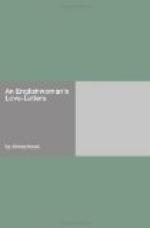Beloved, if I could speak or write out all my thoughts, till I had emptied myself of them, I feel that I should rest. But there is no emptying the brain by thinking. Things thought come to be thought again over and over, and more and fresh come in their train: children and grandchildren, generations of them, sprung from the old stock. I have many thoughts now, born of my love for you, that never came when we were together,—grandchildren of our days of courtship. Some of them are set down here, but others escape and will never see your face!
If (poor word, it has the sound but no hope of a future life): still, IF you should ever come back to me and want, as you would want, to know something of the life in between,—I could put these letters that I keep into your hands and trust them to say for me that no day have I been truly, that is to say willingly, out of your heart. When Richard Feverel comes back to his wife, do you remember how she takes him to see their child, which till then he had never seen—and its likeness to him as it lies asleep? Dearest, have I not been as true to you in all that I leave here written?
If, when I come to my finish, I get any truer glimpse of your mind, and am sure of what you would wish, I will leave word that these shall be sent to you. If not, I must suppose knowledge is still delayed, not that it will not reach you.
Sometimes I try still not to wish to die. For my poor body’s sake I wish Well to have its last chance of coming to pass. It is the unhappy unfulfilled clay of life, I think, which robbed of its share of things set ghosts to walk: mists which rise out of a ground that has not worked out its fruitfulness, to take the shape of old desires. If I leave a ghost, it will take your shape, not mine, dearest: for it will be “as trees walking” that the “lovers of trees” will come back to earth. Browning did not know that. Someone else, not Browning, has worded it for us: a lover of trees far away sends his soul back to the country that has lost him, and there “the traveler, marveling why, halts on the bridge to hearken how soft the poplars sigh,” not knowing that it is the lover himself who sighs in the trees all night. That is how the ghosts of real love come back into the world. The ghosts of love and the ghosts of hatred must be quite different: these bring fear, and those none. Come to me, dearest, in the blackest night, and I will not be afraid.
How strange that when one has suffered most, it is the poets (those who are supposed to sing) who best express things for us. Yet singing is the thing I feel least like. If ever a heart once woke up to find itself full of tune, it was mine; now you have drawn all the song out of it, emptied it dry: and I go to the poets to read epitaphs. I think it is their cruelty that appeals to me:—they can sing of grief! O hard hearts!




